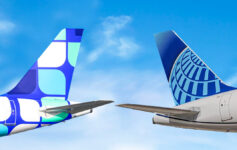James Fallows offers a piece in The Atlantic today following up on the family who was removed from a United flight for complaining about the in-flight movie and also following up on my own expulsion from United flight a week later after a rogue FA lied about me taking pictures onboard.
In response to the ejected family, United has amended its in-flight movie policy, now showing only movies rated PG or G on overhead monitors. A victory for them to be sure, though I believe it is not necessarily the rating, but the specific content–overt violence or sex that cannot be edited like language can–that renders certain films unsuitable to be shown to general audiences.
More interestingly for me was a letter sent into Fallows from a legacy United captain regarding my own ejection:
I am a Captain with United Airlines. I have been with UA for over 25 years. There is no excuse for the way you [actually Matthew Klint] were treated on your Newark Istanbul flight.
Let me tell you how the incident should have been handled. I had a very similar incident on a Las Vegas-Dulles flight. A flight attendant told me of a disruptive passenger that would not move his underage son out of the exit row. I went out of the cockpit to see what was going on. I went to Customer Service and had them come back to the airplane. I spoke with the man. I wanted to hear his side of the story. He began to tell me how UA had put his special needs son in a different row than him. He had moved the child to the row because the FA had not listened to him, but ordered him to move the boy. While he was telling me his side the FA immediately tried to interrupt. I told her to let the man speak. When he was through I told him not to worry the Customer Service person would re-seat them so that we could get on our way.
I wanted to point out the difference in approach to the situation. The flight attendant had told me what she thought was going on. She told me how they had to move or be thrown off the airplane. As a professional I wanted to get all the facts before just arbitrarily removing someone from the airplane. The situation was defused and we went on our way.
I did not come out of the cockpit with the preconceived notion that I was going to throw someone off the ac. In your situation I would not have overreacted over pictures. I did not know such a rule even existed. I am confused about the picture thing anyway. I would have listened to you before I made a determination whether you had to leave.
You need to know that United was not always so anti passenger in the past. Since continental took over our management they have brought in all kinds of rather strange and illogical rules.
1. You cannot take pictures, I assume because of security, but they are paying to have the secondary barriers that protect the cockpit removed from our aircraft.
2. You cannot pay cash for your food or drinks in coach.
3. You can order special meals such as Hindu, but you will most likely get a burger because management is from Texas and everyone likes beef right? (Didn’t work out so well with a group of Indian Hindu engineers in First Class coming from London. You know the sacred cow and all. I apologized to them, but the damage was done.)
We are supposed to speak to our CEO like he is a close friend or something. If you don’t call him Jeff he becomes upset. [JF note: This is Jeff Smisek, well known to all United travelers because of the video ads featuring him that precede the safety instructions on each flight.] They call everyone co-workers. They setup a human resource complaint system so that anyone can file formal complaints against their fellow workers for the littlest thing. You can be terminated. We have over 200 complaints being investigated just for the pilots so far.
My point is the new UA management is anti-employee as well as anti-passenger. It puts a tremendous amount of pressure on everyone. Some people handle it differently than others. I think your case is a perfect example.
I on behalf of all United Airlines employees would like to apologize to you to your ordeal. Management might think they are too important to apologize, but I think you would find the people that make the airline work don’t think that way.
I like what he has to say, though I’ll start with a few minor criticisms.
First, I’d love to know more about how/why United is removing secondary barriers to the cockpit. I did find a Bloomberg article stating that United has not only foregone, but paid Boeing to remove the secondary barrier from the 787.
In her letter to the president, Saracini said United Continental Holdings Inc. recently paid Boeing Co. to remove the secondary barrier from Dreamliner 787s it had ordered.
I am just speculating here, but I think the captain is referring to the “wire cage” that latches across the aisle just in front of the galley on legacy United 757-200s to block passengers while the flight deck door is open. Because the galley cart serves essentially the same purpose, I do not quite see the problem here.
Second, I understand why United (and all the legacies) have done away with cash–I’ve talked to FAs who have admitted that cash from liquor sales is used to augment their income! With alcohol free in the forward cabins, there was far too little accountability in collecting cash from onboard liquor and food purchases. Plus, who doesn’t carry a debit or credit card anymore?
Third, I agree that “since [C]ontinental took over our management they have brought in all kinds of rather strange and illogical rules” but it was a legacy United crew on my Newark-Istanbul flight. I generally find Continental crews to be more lazy and apathetic while UA crews are more prone to trot out the “but 9/11” mantra for anything they are uncomfortable with. Having said that, I can only think of two incidents in my decade of flying legacy United in which that happened–once on this flight and the other time when a JFK-based FA screamed at me to sit down when I got up to take something out of the overhead bin during a p.s. flight in 2007 when the flight deck door was open (this despite the aforementioned “wire cage” being deployed).
His revelation that United has a system in place to rat out employees, if true, is quite disturbing. Nothing creates a culture of fear, mistrust, and hostility then in making it easy for employees to tattle on each other for any reason without recourse.
Most importantly, I like the way he handled his own passenger controversy. Many defended the captain who thew me off the Istanbul flight for taking the side of the FA, arguing his focus had to be on getting the flight out on time and it would have undermined this FA, his ability to gain trust from all his FAs, and potentially created a hostile working climate if he had taken time to hear both sides before kicking me off.
This captain makes a fine counter-argument, showing that a few minutes of genuine concern and leadership can get to the bottom of the matter and solve it. We must not forget how serious it is to throw a passenger off the plane, particularly on the pretense of a mistruth.
What do you think about the captain’s letter? A thoughtful and insightful letter that reveals the deep fissures between management and pilots at United Airlines or a letter from a disgruntled pilot angry that life under the new United seems worse than before?




Hi Matt –
First of all, glad to read that you’re continuing to receive high publicity levels with this situation 🙂 Kind of cool to have your story making its rounds these days.
Secondly, I think that the letter from the captain published in Fallow’s article has some excellent points, coupled with a few mixed-reaction statements.
I’ll elaborate: first, he/she offers some VERY didactic advice in conflict resolution, and how important it is to hear both sides of the story rather than simply exert force or authority to inflict fear and embarrassment.
I think everyone who read the account of your story similarly felt the same stomach-dropping reaction upon reading how the CO crew handled the situation on your flight. I felt second-hand embarrassment for them just simply knowing that these people have zero clue on how to constructively navigate their way through difficult circumstances. And, as I’ve mentioned in prior comments, the passive, childish behavior of the FA post-ball drop only sheds light on how she probably regretted her actions immediately following. These people should NOT be working in the services industry, or at least need to have some sort of intervention and receive new training.
However, going back to the letter, I think the Captain should have stopped there. The finger-pointing at sCO policies and leaderships was a low-brow move, and highly unprofessional. Also, some of his facts are a bit inaccurate, like the cashless-cabin situation (that’s not a sCO policy, that’s become a universal policy!)
It’s been years since the merger closed, and at this point, if you’re not part of the solution, you’re part of the problem. The mud-slinging contest between sUA and sCO employees is getting out of hand. IMO, as I constantly say, the fish stinks from the head. SMI/J and his cronies need to fix this situation STAT and encourage teamwork and unity. He/she doesn’t propose any reconciling suggestions to help fix the company, which to me, is a really cop-out deviation from the more constructive viewpoints he/she offered in the first half of the letter.
Just my 2 cents.
A couple of fun observations:
“Plus, who doesn’t carry a debit or credit card anymore?”
Answer: My ancient in-laws who fly in from Ukraine and don’t understand the concept of a credit card. Funny story: My wife didn’t understand the concept either when she moved here and after buying a cartload full of groceries, tried to pay for them with the Safeway discount card. She hadn’t brought the credit card I had given her. She had to abandon the cart there at checkout. Lots of international passengers don’t have credit cards. Anyways, hasn’t affected them yet since they fly European carriers where the drinks are free. They still pay their utility bills either at the office or, get this, a person comes by their apartment to pick up the money!!! Let me know if you want to see Odessa or Lviv! (ODS/LWO)
Next, regarding the pilot saving time and ejecting you because he was running late. I wonder… you probably had a checked bag on the EWR->IST, yes? I expect that it probably took a lot longer for them to find and yank that bag from the cargo area than a 5 minute investigation.
Sadly, the snitch factor was appropriate for the captain to bring up in this context: If he sides with the passenger against a frumpy FA, that FA will look to retaliate against him. I have had some pretty funny HR incidents from frumpy jerks looking to backbite me. I prefer to let them complain and have a good laugh afterwards but I wonder if some captains would prefer to not rock the boat and give the FA bullies leeway.
You are completely wrong about the secondary barrier – the drink cart does not provide the same level of protection as a purpose-designed wire gate. Any decent high-school track athlete could jump over the drink cart and (attempt to) access the open cockpit door during crew breaks. The FACT that United is paying money to remove existing barriers speaks volumes about how much they care about their employee (and ultimately passenger) safety. I am not an employee of United. Smisek is ruining this once great company.
@jeff, wouldn’t the door be shut by the time he leaps the drink cart? Or unlatch the gate? I don’t see the difference.
But, I have no idea why UA would pay to REMOVE these.
I can think of one simple reason to invest in removing the barriers if they are not needed: weight.
I don’t see the need for the wire barrier. To the best of my knowledge, UA is the only airline to have them so I don’t understand the “foul play” calls.
Paying to remove from the 787 also makes sense.
1) Weight. Airlines look for ways to shave weight for fuel savings.
2) Consistency. FA’s “flip flop” between aircraft types more easily than pilots. As much as possible, they need to standardize procedures.
I started off appreciating the Captain’s letter. He started losing me when he started his rant on CO management. I agree with him on those aspects but they were out of context since the items he was complaining about were pmUA related. From there his letter felt to me more like someone venting than being sincerely concerned over your incident.
I’m not exactly 100% against the snitching.
I worked for AA 1983-2001. There was not a formal “snitching” process, but the understanding that anybody could “write you up” at any time from Supervisor to passenger to co-worker.
Airlines are vast operations wether looking at the whole operation or even a single hub. Your employees are spread out all over the place. Combine this with the fact that it takes co-operation from many folks in dozens of departments to get a flight out. A chain is only as strong as its weakest link, we were encouraged to point out links that were about to break.
I think we’re taking the Captain’s comments on the “snitching” a little out of context and making it sound worse than it is.
Mu career gradually shifted from Gate AAgent to Programmer, my job eventually sold to EDS. My EDS Manager called me in 1 day wanting to clean out my personnel file of old AA stuff. I had never seen my file. He plunked down a 4 inch book !!
Both delays I had taken over the years were still documented.
3 complaint letters from passengers and 5 compliments.
As for the “human resource complaint (snitch) system”, my co-workers had submitted ZERO complaints and literally over a hundred compliments.
Sadly, I knew of the 3 passenger complaints (2 were written off as not me due to gate/flight involved, but were placed in my file as the closest name match). I knew NOTHING of the compliments in my file 🙁
Re “3. You can order special meals such as Hindu, but you will most likely get a burger because management is from Texas and everyone likes beef right?”
A FA explained this one to me: when continental took over, they switched computer systems to the cheaper one. Which had no support for special meals. So you ordered them on the website. And the info went no place. Which might be enough to sue UA for mis-representation with possible health implications.